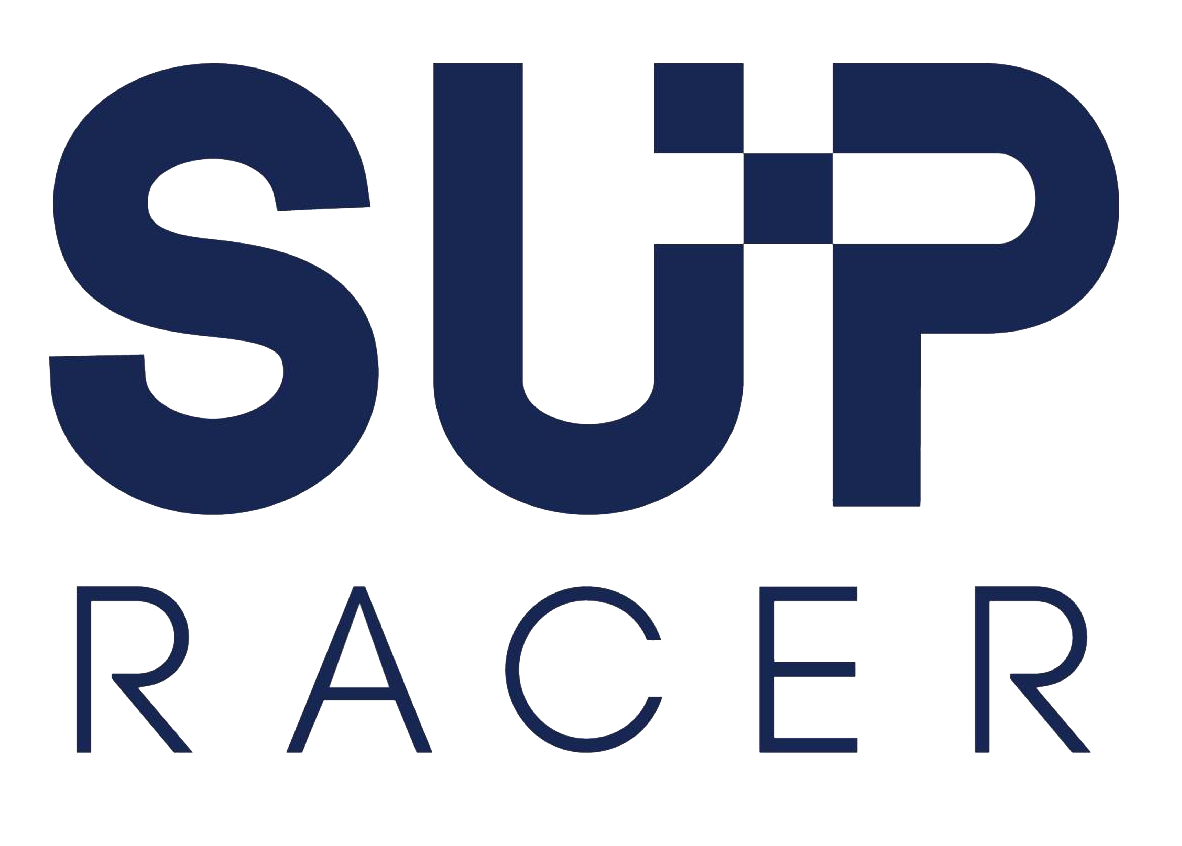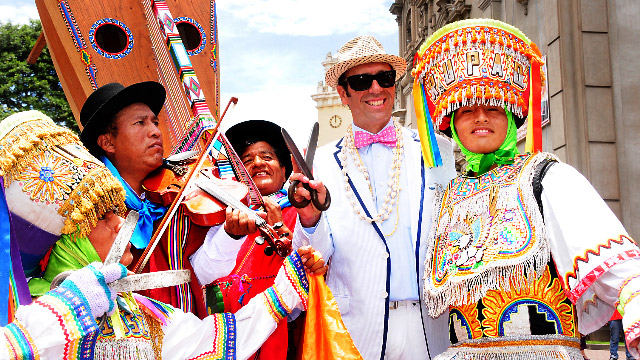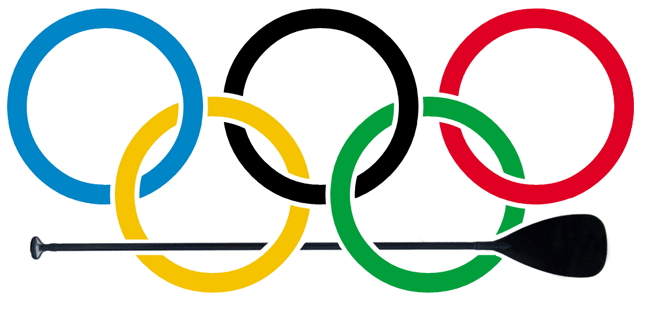
Meet The Man Who Wants To Make SUP An Olympic Sport (And Then Ask Him A Question…)

Fernando Aguerre On The Olympics, The ISA World Champs And… Colourful Bow-Ties
Me: “So how long have you been working to get surfing in the Olympics?”
Fernando: “Well… my whole life actually.”
And with that comment Fernando Aguerre, the International Surfing Association (ISA)’s charismatic President and promoter-in-chief, recounts the full story of his childhood in Argentina and the early influence of surfing on he and his brother.
At age 11, after five years of bodyboarding on plywood bellyboards, the Aguerre boys discovered and were able to try one of the very first surfboards in Argentina. It was ugly, heavy and didn’t have a particularly good shape, but they convinced their dad to allow them to sell one of their bicycles so they could buy the board. They were instantly hooked.
But growing up a surfer in 1970s Argentina wasn’t exactly straightforward: There were less than 100 surfers in the country when Fernando started, wetsuits and leashes did not exist, and the boards weighed 20 kilos, which made it a tough walk for the Aguerre boys who lived ten blocks from the ocean. Yet that was the easy part…
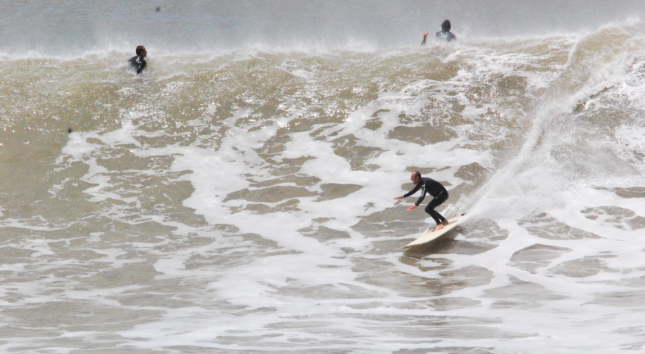
Fernando surfing back “home” in Argentina recently. It’s a lot easier surfing in the country these days…
There was also the small matter of a repressive government regime that didn’t think too highly of surfers.
Fernando was a student association leader during high school, at least up until all student associations were banned by the government in 1975. By then, the serial entrepreneur had also become a party promoter and DJ, with his parties quickly growing from 100 to 1,000 people. However in 1976 the military took over of Argentina in a bloody coup d’etat and one year later, Fernando’s parties were shut down by the government due to “banned music” being played. Twice in two years the government had shut him down.
A one-year stint in the military followed, thanks to the national draft, before Fernando returned to his hometown wanting to do nothing but surf. But again the government had other ideas…
When Fernando returned home it was 1977 and the military government had just banned the new sport of surfing, because the leaders had a general distrust of the long-haired youth that hung around at the beach all day. Having lost his first two battles against the government, this time around Fernando refused to give in: He rallied some friends, founded the first national surfing federation, and started a campaign to have surfing legalized. The federation’s efforts included promoting the sport, organising surf contests and even the first ever surf and skate mag in Argentina.
However all of this had to take place under the radar, otherwise Fernando risked himself, his brother or their friends becoming one of the grim “disappeared” statistics; the term that the 30,000 individuals who were kidnapped, tortured and killed by the military were officially filed under.
So despite beginning as a clandestine operation, under his leadership the Argentine surfing federation worked to have surfing become more and more of an accepted pursuit and within just one year the goal was achieved. At that point Fernando also stumbled into being the federation’s national media manager, in addition to President, and eventually got the sport its own radio and TV shows.
Or in other words: he’s being doing what he does today – enthusiastically promoting the development of surfing and paddling at every possible opportunity – for well over three decades, the past 20 of which have been as President of the ISA.
For those that have never met, seen or heard from Fernando Aguerre, he’s quite a character: A youthful-looking 56-year-old that wears bow-ties & colorful suits to official functions, or flip-flops & surf shirts during the day. He’s an unstoppable networker that knows everyone worth knowing in the surfing and Olympic worlds, yet remembers you even if you’re not. He speaks fluent Spanish, English and Portuguese. He’s a bit flamboyant, he’s charismatic and he’s an extremely energetic diplomat for the surfing world and culture.
In fact “Surfing’s Diplomat” is the description that Fernando believes best summarizes his work.
Though with all these mentions of the word “surfing” it’s important to note here that for Fernando (as well as the actual ISA Constitution) surfing means not only shortboard wave riding, but also any act of riding waves or even any act of riding a surfboard, period, whether it be chasing waves, ocean swells or simply paddleboarding on flat water.
Paddleboarding.
That’s a term, and a sport, that goes to the heart of this whole topic. It’s the missing link that connects the worlds of traditional surfing and SUP racing.
Fernando’s house is a virtual museum to the history of the surfboard and his collection includes a 100 plus year old wooden boards from Hawaii and California, including one Tom Blake paddleboard. The board is a heavy old wooden brick that even Jamie Mitchell would struggle to paddle, but which holds a unique place in the history of surfing, paddleboarding and, by extension, the history of stand up paddleboard racing as well.
Arguments can be made that our sport is derived from ancient canoeists, but the simple fact is the modern day version of SUP came from a paddleboarding and surfing lineage. From the Tom Blakes to the Waikiki Beach Boys to Laird & Dave messing about during their down days on Maui, stand up paddling and surfing go hand in hand.
Kai Lenny, the reigning Battle of the Paddle king, isn’t a world champion in C1 sprint canoe. He’s a world champion in SUP surfing. Jamie Mitchell doesn’t do laps of the Olympic rowing course in his SUP racing off-season, he surfs 40-foot waves across the globe. The Wikipedia entry for SUP isn’t titled “Stand up paddle canoeing” it’s simply “Stand up paddle surfing.”
The whole point is this: With its surfing heritage, Fernando Aguerre believes the ISA is and should be the international federation and the best platform to help develop the sport of stand up paddling (both surf and race) around the world, with a particular focus on the push towards Olympics inclusion (a push that’s already in motion).
“Who The F%#k Does The ISA Think They Are?!”
Within the core SUP community, especially the racing side of the sport, the ISA has had an oft-misunderstood role. In the early days many were skeptical: “Who is the ISA to say they can come in and run our sport?!” was an early theme among a certain section of the elite crew, while even today there are some who either refuse to support or are simply apathetic towards the ISA’s work.
I can understand exactly why they feel that way, but I believe it’s a mistake. A big mistake.
While the ISA needs to do a lot more to justify their role within the SUP community, the core SUP community also needs to be much more open in accepting the guidance and governance of others.
It’s a two-way street and only if we become united and work together for the mutual benefit will SUP become a truly global sport and, just maybe, an Olympic sport one day as well.
Stand up paddlers, especially the hardcore racing type, are a funny bunch. We speak in terms of “our” sport, not “the” sport. We act as if we own it simply because we were doing it first. Even if it’s not our intention (and I doubt it is) most of us stand up paddlers have an inward, protectionist view of the world when it comes to this sport.
It’s as if we refuse to open our arms to outsiders.
“This is our sport. We know what’s best. We know how to run it. Hands off!!”
It’s this tribal culture that makes the SUP community so special. It’s what makes us so passionate and so determined to nurture this amazing sport. However it’s also what will hold us back if we naively continue down the same path and refuse to work with others towards a common goal. Especially when those “others” have the ability to do something well above and beyond what our “tribe” could do on its own.
You see, the ISA isn’t trying to run the entire world of SUP. They’re not trying to “own” it. They’e not going to stand on the beach at your next race and tell you how to hold your paddle. They’re not trying to do any of that. All ths ISA wants to do is help develop and guide the sport of SUP.
And they want to guide it to one place in particular: The Olympic Games.
Unbeknownst to 99% of paddlers, there are political battles happening right now between various international sports federations for a slice of the SUP pie. Some of these organisations have no connection to our sport other than knowing it’s growing like crazy and could potentially be in the Olympic Games one day.
The ISA wants a slice of the SUP pie too, however they’re the one major international organization that has a legitimate connection to the core SUP community and that, I believe, has the best interests of the sport in mind.
Also unbeknownst to many paddlers is that, behind the scenes, the ISA has done more work towards progressing the sport of SUP on a global level than most hardcore paddlers could ever dream of. While the diplomatic battle to get surfing and SUP racing in the Olympics is a long, tough, political road that deserves it’s own article (or rather: book), I summarize it like this:
If you believe in the dream of Olympic SUP, you should be supporting the ISA right now.
The Future Of SUP In The Eyes Of The ISA…
And that brings us to today.
After I was lucky enough to attend a couple of very interesting meetings in the past few months, where the ISA updated industry VIPs on the progress of their Olympic push, I sat down one-on-one with Fernando and asked him some straight up questions about the future of the ISA, where SUP racing fits into the vision and why the core community should/shouldn’t get behind the ISA World Championship event.
For one, despite “surfing” being in the Association’s name, the ISA has made SUP racing one of its headline acts in recent times – they see the discipline as being not only a part of the surfing world but as a likely contender for Olympic Games acceptance as well.
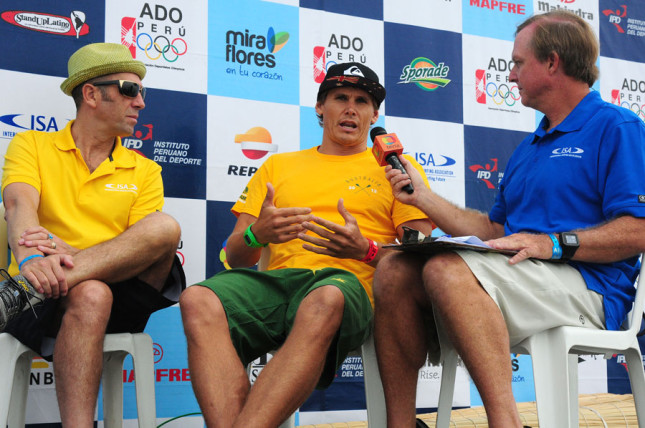
Jamie Mitchell being interviewed before the SUP racing in Peru (Note the Olympic Rings in the background…)
Think of the Olympics and you instantly think of events like the 100 metres on the track or 50 metres in the pool. They’re both races. While there is room for a “judged” event like surfing, events that are pure A to B races would seem to have an advantage.
Start over here, end over there and the first athlete to cross the line wins Gold. Simple.
That makes SUP racing unique in the world of surfing and could give it an edge in the notoriously difficult and bureaucratic Olympic world.
A few months ago Fernando quipped; “If shortboard surfing was in the Olympics right now, SUP racing would be in there tomorrow. No question.”
I spoke to him again last week and that had evolved into: “Actually today, under the ISA, SUP racing probably has a better chance of being the first surfing discipline to make the Olympics…”
Fernando – who might not have been on the beach at Dana Point in 2008 but who has since fallen in love with SUP (he paddles regularly, while his partner Florencia SUP surfed for the Argentinean team in the 2012 ISA World SUP and Paddleboard Championships in Peru, and will be representing Argentina at the upcoming World Championship in Nicaragua) – expands on how serious he is about getting SUP racing into the Olympics:
“If surfing was accepted, I would have a very hard time not including SUP racing. It’s dynamic, it’s exciting, a bunch of guys and girls going at it, splashing water… It’s fun! I am always interested in fun things.”
In the eyes of Aguerre and the ISA, stand up paddleboard racing has the chance to be one of the fresh, new, modern sports that the International Olympic Committee (IOC) will inevitably introduce in a bid to keep the games relevant. If kayaking is basketball, then SUP racing could be the beach volleyball of the Olympics. It could be what snowboarding was to traditional Winter Olympic sports.
In other words, the ISA doesn’t want to see paddlers slowly making their way down the lanes of the Olympic rowing course (as other international federations perhaps might prefer). Instead they’d opt for a full on, Battle-style course race, whether it be on flatwater or in the waves.
“It could be very intense. We don’t want it to be boring.”
The “World Championship” Event
All of which brings us to the upcoming ISA World Standup Paddle and Paddleboard Championship in Nicaragua.
Scheduled for May 3rd-11th (just three months away), the event is set to draw hundreds of paddlers from at least two dozen countries to Nicaragua for a week of SUP racing, SUP surfing and prone paddleboarding. It’s essentially the Olympics of Paddleboarding, with athletes competing as members of their National Teams first and foremost, rather than as individuals.
It’s also an event with a brief but rather interesting history.
The first two editions were held in the same place (Peru) and while both those events were organised very well (in some respects…) and drew some big names (eg. Travis Grant and Jamie Mitchell) they were just as noticeable for who wasn’t there as who was. The level of competition in Peru was never on par with the Battle of the Paddle, or even several of the other big races on the calendar, which in turn has given some parts of the SUP community cause to dismiss the event as unworthy.
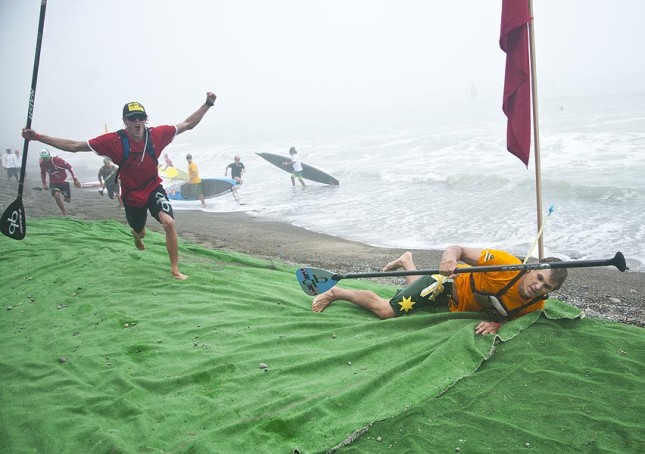
Despite missing a few big names, the racing at last year’s ISA Worlds was some of the most exciting I’ve seen. Here, Casper Steinfath proudly won the distance race Silver right behind Jamie Mitchell.
There is some truth in that, but dismissing any event on that one metric alone, not least an event that could potentially pave the road to an Olympic berth, is short-sighted. The ISA World Champs is all about the long game.
That’s not to say the event is perfect or that it deserves the unreserved support of the core SUP community. It’s not and it doesn’t. Not yet anyway.
The ISA World Champs has significant issues that the Association needs to address: The logistics for paddlers in Peru ranged from half-decent to nightmarish, depending on how organized your individual country was and how lucky you got with airlines/customs officers. The ISA was rightly criticized for not helping enough, though that’s something Fernando informed me they’ve taken to heart and have worked hard to avoid in Nicaragua.
But the logistics was just one side of the equation. The other, much more significant part was the legitimacy of the event.
In a sport where events gets ranked based on how many pros show up and what the general level of competition is, the ISA World Championship was always going to be behind the eight ball. The very format (limited entrants from each nation, as in the Olympic Games) means it’ll never see every single Top 20 paddler in action, at least not when Hawaii, California and Australia hold onto 90% of those places. But even taking that into account, the previous ISA World Championship events have been missing several eligible paddlers as well.
A “World Championship” of paddleboarding is a little hollow if Hawaii isn’t represented at all (as has been the case the first two years), while the USA’s efforts in sending a skeleton squad to Peru in 2013 did the ISA’s cause no favours.
The ISA has been aware of this. Perhaps not as aware as they should have been, or rather, not as proactive in resolving the issue as they should have been. Yet from what I’ve heard in the past few week, they’re going to be working very hard to ensure there’s no repeat of this in the future.
Having strong teams from Hawaii, the U.S. and Australia at the ISA World Champs certainly isn’t the only way for the event to prove its worth, but it’s definitely a significant factor.
The event has a long way to go, but again, it’s not just the ISA that needs to correct its course and develop better relations with the core SUP community, it’s also the core SUP community that needs to put politics aside and support an Association and an event that has more or less the exact same goals as the community itself.
Again, if any paddler has a dream of seeing SUP in the Olympcs, I believe they should be supporting the work of the ISA right now.
And when we speak of the ISA, we are essentially speaking about the work of Fernando Aguerre as well.
The Duke’s Dream
Fernando works tirelessly for the San Diego-based ISA, despite not getting paid a cent.
Sure, the cynic will say “Well that’s easy when you’re rich…” (Fernando and his brother co-founded Reef Sandals in the 80s, later selling it for a rather large sum). However the optimist would contend that in this day and age, working for nothing but passion, no matter what your circumstances, is a noble pursuit.
Instead of being motivated by money, Fernando is motivated by a vision for where both surfing and paddleboarding can go in the future. I’m sure he enjoys being “The Guy” however I’m also sure he’s smart enough to realize only a team effort could accomplish such a bold vision, and that, as President, he’s also taken on a relatively thankless job.
So what is the vision?
Fernando’s work is motivated by the “Duke’s Dream,” where the godfather of modern surfing asked the IOC to include surfing as a sport way back in 1920.
And it’s that vision, of having the sport of surfing in the Olympics – whether it be through shortboarding, SUP racing, or both – is what drives Fernando and all of those who work for the ISA. It’s a vision they’ve worked tirelessly toward for decades, but which has kicked into serious overdrive in the past four or five years.
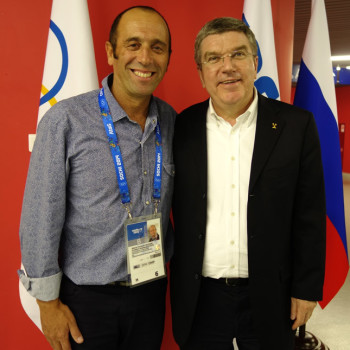
ISA President Fernando Aguerre met with the International Olympic Committee (IOC) President, Thomas Bach, just a couple of weeks ago in Sochi, Russia
Many paddlers in the community would have no idea how much work the ISA has done to advance the cause of SUP around the world in the past few years. Not just through the ISA World Champs, but in private meetings with the IOC and other influential sports organizations and other regional, multisport Games across the globe that are tied to the Olympic Movement. For example in last year’s South American Beach Games (where 15 countries participated), both surfing and SUP racing were included. While Fernando is now negotiating for inclusion of just SUP racing alone in the Asian Beach Games later this year, as well as in the 2019 Pan Am Games, to be held in Lima, Peru.
In Sochi a couple of weeks ago, Fernando got a priceless one-on-one meeting with the President of the IOC, Thomas Bach (aka the guy that runs the Olympics), where he further pushed for surfing and paddleboarding to be considered.
In short: Stand Up Paddling’s road to the Olympics is long and hard, but the ISA is already a lot further down the road than any other organisation. Most paddlers themselves wouldn’t even know where that road begins, let alone how to navigate it; while the core community often struggles to get its act together, the ISA is already two steps ahead, working to promote SUP on a level way above and beyond where our sport currently sits.
Another often misunderstood piece of the puzzle is that the ISA is actually already recognized by the IOC (and has been since 1995), which is a major step in reaching the Games. If the IOC magically woke up tomorrow and said SUP racing would be in the next Olympics (though it’s not quite that easy unfortunately) the ISA would actually be the International Federation in charge of organizing “our” sport.
So why then, if the ISA is already the de facto International Federation, is there such a disconnect between the Association and some sections of the SUP community? Why don’t we all get along if we’re all trying to go in the same direction?
Again, this comes back to the ISA needing to do more to connect with the core community: Stronger outreach, better communication, more regular dialogue and so on.
But it also comes back to the community needing to do more to open their arms as well. We can remain a tribal pursuit or we can become a truly global sport.
I’m not suggesting we should all drop everything and rush to Nicaragua, or that the ISA are our saviors and we don’t need any other organizations involved. The ISA World Stand Up Paddle and Paddleboard Championship is not the only event we need to support in order to lift the status of SUP racing as a legitimate sport, nor is the ISA the only group that should help govern it.
And even the ISA themselves don’t want to be the only show in town. That’s not healthy for a sport. Professional world tours and athlete-driven organisations have their place; the ISA World Champs isn’t trying to replace those events or associations. However having a legitimate, nation-based World Championship event featuring hundreds of paddlers from dozens of countries, organized by a respected, IOC-recognized International Federation is the only way the Olympic power-brokers would ever give a second glance towards our sport.
Again, the ISA isn’t trying to control the sport, they just want to see it in the Olympics one day.
Isn’t that what we’d all love to see?
But to reach such a point we need to drop the politics (or “paddletics” as Jimmy Terrell famously once said) and get united behind a common goal. Both the core paddling community and the ISA want the same things for the sport of stand up paddling, especially SUP racing, we just don’t realize it.
It’s like we’re moving in parallel but not in tandem.
The biggest issue I’ve had with the ISA, and what many other paddlers seem to agree on, is that the Association has done a poor job of outreach. Such outreach is vitally important, meaning the current level of interaction between the ISA and the core SUP community has to change. So let’s change it. Meanwhile, Fernando has garnered a strong reputation for being an advocate of change, so let’s combine the two.
“Ask Me Anything”
Just a few days after I last spoke with him, Fernando was in Sochi for the Winter Olympic Games, networking with anyone and everyone related to the IOC and its related organizations, including President Bach.
Some would say SUP in the Olympics is a blind dream, while others believe there’s no reason it shouldn’t be there now. The reality lies somewhere in the middle: It’s an incredibly long, tough battle to reach the Games, full of behind-the-scenes politics, networking and deal-making. But with the ISA and El Presidente Aguerre working for us (and with us), the sport has a real chance.
As Fernando says: “I’m not a dreamer, I’m a practical idealist.”
So yeah, if it wasn’t evident already, it should be clear to you now: Fernando Aguerre is an interesting character. Though here’s where it gets really interesting… At the end of our recent chat, Fernando said bluntly:
“Chris, let your readers contact me at the end of your article. Tell people they can ask ANY kind of questions about the ISA and our work within the Olympic Movement…”
I asked him if he was serious and if he’d seen the kind of stuff that gets posted on Facebook and the SUP forums..? Did he really want to take direct questions from the enthusiastic but sometimes ‘overly-passionate’ (to put it politely) SUP audience?
“I’m serious! I don’t sit up in a crystal tower. I want to be a bridge builder. I live in the real world.”
Ok, you asked for it.
I hope this article has given you an insight into who and what the ISA, and its President Fernando Aguerre, really are. Bet let’s not stop there. In the spirit of being united and working in tandem, not parallel, let’s open up some dialogue between the ISA and the core community.
Leave a comment below and ask the ISA and President Fernando Aguerre anything you like.
Questions… Comments… Positive words or negative words, anything at all you want to know about the ISA and its intentions for the future of SUP.
Whether you want to ask Fernando why paddlers should support the upcoming World Championship event, or if you want to know exactly how the ISA plan on getting SUP into the Olympics, or if you want to know why we’re racing on a lake in Nicaragua instead of the ocean, or if you just want to find out where Fernando buys his colorful bow-ties…
Fernando will personally respond to every question in a follow-up Q&A we’ll be doing next week. And if the answers in that next article don’t satisfy the hardcore paddler within you, we’ll even include Fernando’s personal email address at the end of the Q&A so you can continue to question him.
This is a pretty cool offer… Imagine the Presidents of FIFA, the NFL or the NBA asking fans to question & critique them directly. That wouldn’t happen. But this is happening, so here’s your chance to take your questions or concerns directly to the top.
If you care about the future direction of SUP, leave your question or comment below…
[device](Reading this on an iPhone/mobile? Can’t see the comments box below? Click the “Mobile Theme ON/OFF” button at the bottom of the page)[/device]
